Smith College Welcomes New Faculty Members
News of Note

Published October 14, 2021
Twenty-one new tenure-track professors have joined the Smith faculty this year.
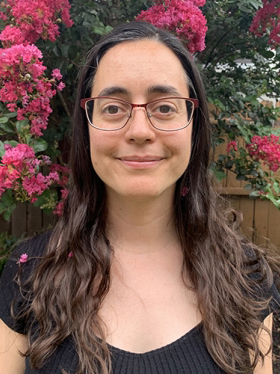 Mariana Abarca, assistant professor of biological sciences, received her M.S. degree in environmental biology from Universidad Nacional Autónoma de México and her Ph.D. degree in biological sciences from George Washington University. Her research focuses on understanding the effects of global change on plant-insect interactions. Using Lepidoptera (moths and butterflies) as a study system, Abarca examines how herbivorous insects respond to seasonal alterations, thermal stress and changes in the community composition of their host plants and natural enemies. Her approach encompasses natural history observations, experimental manipulations both in the field and the laboratory, and the implementation of ecological modeling techniques. Her teaching interests include quantitative ecology, applied ecology, and global change biology. Before coming to Smith, Abarca was an assistant research professor at Georgetown University studying the effects of thermal stress on butterfly seasonality, and the ecological trade-offs that affect herbivore diet-breadth.
Mariana Abarca, assistant professor of biological sciences, received her M.S. degree in environmental biology from Universidad Nacional Autónoma de México and her Ph.D. degree in biological sciences from George Washington University. Her research focuses on understanding the effects of global change on plant-insect interactions. Using Lepidoptera (moths and butterflies) as a study system, Abarca examines how herbivorous insects respond to seasonal alterations, thermal stress and changes in the community composition of their host plants and natural enemies. Her approach encompasses natural history observations, experimental manipulations both in the field and the laboratory, and the implementation of ecological modeling techniques. Her teaching interests include quantitative ecology, applied ecology, and global change biology. Before coming to Smith, Abarca was an assistant research professor at Georgetown University studying the effects of thermal stress on butterfly seasonality, and the ecological trade-offs that affect herbivore diet-breadth.
Johanna Brewer, assistant professor of computer science, is a technology design activist who joins Smith after a decade spent leading several nontraditional companies. Having earned their Ph.D. in informatics from the University of California, Irvine in 2009 for work on the aesthetics of urban mobility, Brewer went on to found a series of counterculture startups, including frestyl for live music discovery, Rhomby for anti-surveillance smart homes, and Neta Snook for diversity-focused R&D. Currently the director of research for AnyKey, a nonprofit that advocates for diversity and inclusion in competitive gaming and livestreaming, Brewer is excited to bring their Inclusive Design Lab to the Smith campus and offer the next generation of technology scholars an opportunity to enact positive social change in the world through their code.
 Luca Capogna, professor of mathematics and statistics, received his Ph.D. in mathematics in 1996 from Purdue University. Prior to joining Smith, he was professor and head of the department of mathematical sciences at Worcester Polytechnic Institute. His research is in the area of analysis and partial differential equations, with applications to geometric questions in quasiconformal mappings and geometric flows. Most recently he has been interested in problems of system identification in machine learning. Capogna has taught a broad range of mathematics courses, from introductory to advanced graduate courses. He has served as advisor for six Ph.D. dissertations, and has directed several undergraduate theses. Over the years, Capogna has developed and supported a number of outreach programs aimed at increasing participation of underrepresented minorities in the mathematical sciences, and he looks forward to continuing in this direction at Smith College.
Luca Capogna, professor of mathematics and statistics, received his Ph.D. in mathematics in 1996 from Purdue University. Prior to joining Smith, he was professor and head of the department of mathematical sciences at Worcester Polytechnic Institute. His research is in the area of analysis and partial differential equations, with applications to geometric questions in quasiconformal mappings and geometric flows. Most recently he has been interested in problems of system identification in machine learning. Capogna has taught a broad range of mathematics courses, from introductory to advanced graduate courses. He has served as advisor for six Ph.D. dissertations, and has directed several undergraduate theses. Over the years, Capogna has developed and supported a number of outreach programs aimed at increasing participation of underrepresented minorities in the mathematical sciences, and he looks forward to continuing in this direction at Smith College.
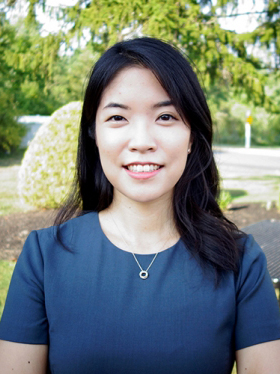 Shinyoung Cho, assistant professor of computer science, earned her Ph.D. in computer science from Stony Brook University in summer 2021. Her primary research agenda focuses on the field of network security, privacy and network measurements. Her current research focuses on detecting and mitigating the activities of the network-level entities like autonomous systems against accessibility, security and anonymity using various algorithms and global continuous in-depth measurements. Her recent work focuses not only on detecting both when network protocols are repurposed for Internet censorship and when something is potentially malicious, such as the hijacking of network traffic, but also on mitigating the threats that prey on the vulnerability of the Tor network. During her Ph.D., she spent time as a visiting researcher at the University of Massachusetts, Amherst, IIJ research lab in Japan, and CAIDA in the University of California San Diego.
Shinyoung Cho, assistant professor of computer science, earned her Ph.D. in computer science from Stony Brook University in summer 2021. Her primary research agenda focuses on the field of network security, privacy and network measurements. Her current research focuses on detecting and mitigating the activities of the network-level entities like autonomous systems against accessibility, security and anonymity using various algorithms and global continuous in-depth measurements. Her recent work focuses not only on detecting both when network protocols are repurposed for Internet censorship and when something is potentially malicious, such as the hijacking of network traffic, but also on mitigating the threats that prey on the vulnerability of the Tor network. During her Ph.D., she spent time as a visiting researcher at the University of Massachusetts, Amherst, IIJ research lab in Japan, and CAIDA in the University of California San Diego.
Terry-Ann Craigie, associate professor of economics, received her M.A. and Ph.D. degrees in economics from Michigan State University. Her research largely explores the intersectionality of inequality, labor markets and mass incarceration, where she evaluates whether policy reforms can curb racial-ethnic disparities in the U.S. labor market and criminal justice system. Craigie comes to Smith from Connecticut College, where she was also an associate professor of economics.
 Maleka Donaldson, assistant professor of education and child study, focuses her research on learning from mistakes in real-world contexts, including how daily teacher-student interactions shape instruction. Her work appears in several peer-reviewed journals, and she recently published a sole-authored book, “From Oops to Aha: Portraits of Learning from Mistakes in Kindergarten” (Rowman and Littlefield, 2021). The research for her book examined the practices of four public school kindergarten teachers in order to understand and juxtapose how the classroom culture of mistakes manifested through their micro-level responses to children. Donaldson holds an Ed.D. in human development and education, two Ed.M. degrees (human development and psychology; learning and teaching), and an A.B. in biology from Harvard University. Before joining the Smith faculty, she was assistant professor of early elementary education at the University of Hartford. Her courses at Smith will focus on the learning sciences and on elementary-level STEM teaching methods.
Maleka Donaldson, assistant professor of education and child study, focuses her research on learning from mistakes in real-world contexts, including how daily teacher-student interactions shape instruction. Her work appears in several peer-reviewed journals, and she recently published a sole-authored book, “From Oops to Aha: Portraits of Learning from Mistakes in Kindergarten” (Rowman and Littlefield, 2021). The research for her book examined the practices of four public school kindergarten teachers in order to understand and juxtapose how the classroom culture of mistakes manifested through their micro-level responses to children. Donaldson holds an Ed.D. in human development and education, two Ed.M. degrees (human development and psychology; learning and teaching), and an A.B. in biology from Harvard University. Before joining the Smith faculty, she was assistant professor of early elementary education at the University of Hartford. Her courses at Smith will focus on the learning sciences and on elementary-level STEM teaching methods.
Yael Granot, assistant professor of psychology, received her Ph.D. in social psychology from New York University and her B.A. from Vassar College. Her research focus is psychology and law. She uses eye tracking and other experimental techniques to examine how people make legal judgments. She also explores how people develop attitudes about justice, and is currently exploring this in the context of adolescents’ experiences with school discipline and school-based policing. Granot comes to Smith after serving as an assistant professor at Loyola University Chicago for three years. At Smith, Granot teaches social psychology, research methods and a seminar on the intersection of psychology and law.
 Efadul Huq, assistant professor of environmental science and policy, completed his doctoral degree in regional planning at the University of Illinois, Urbana-Champaign. Huq’s research analyzes relationships between socio-ecological change and regional development that shape livelihoods and ecosystems across urban and rural regions in the context of global displacements and climate change. Huq's teaching and scholarly pursuits span areas of southern urbanism, international community development, urban sustainability and political ecology with a geographic focus on South Asia and the United States. Huq also co-founded a community-based archive called Queer Archives of the Bengal Delta, which preserves queer social and political artifacts and memories, and produces situated analysis of global gender and sexual politics.
Efadul Huq, assistant professor of environmental science and policy, completed his doctoral degree in regional planning at the University of Illinois, Urbana-Champaign. Huq’s research analyzes relationships between socio-ecological change and regional development that shape livelihoods and ecosystems across urban and rural regions in the context of global displacements and climate change. Huq's teaching and scholarly pursuits span areas of southern urbanism, international community development, urban sustainability and political ecology with a geographic focus on South Asia and the United States. Huq also co-founded a community-based archive called Queer Archives of the Bengal Delta, which preserves queer social and political artifacts and memories, and produces situated analysis of global gender and sexual politics.
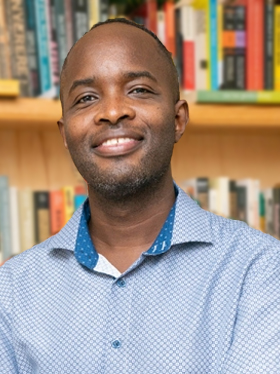 Aaron Kamugisha, Ruth J. Simmons Professor of Africana Studies, received his Ph.D. in social and political thought from York University, Toronto. He is the author of “Beyond Coloniality: Citizenship and Freedom in the Caribbean Intellectual Tradition,” and has edited four volumes on Caribbean cultural and political thought (as well as co-editing another four). In addition, he has edited or co-edited five special issues of journals devoted to the Caribbean intellectual tradition. The subjects of his numerous published articles range from Sylvia Wynter and C.L.R. James to Rihanna, and he has taught a wide range of courses on African and Caribbean political philosophy, Black and Caribbean popular culture, and race and nationalism.
Aaron Kamugisha, Ruth J. Simmons Professor of Africana Studies, received his Ph.D. in social and political thought from York University, Toronto. He is the author of “Beyond Coloniality: Citizenship and Freedom in the Caribbean Intellectual Tradition,” and has edited four volumes on Caribbean cultural and political thought (as well as co-editing another four). In addition, he has edited or co-edited five special issues of journals devoted to the Caribbean intellectual tradition. The subjects of his numerous published articles range from Sylvia Wynter and C.L.R. James to Rihanna, and he has taught a wide range of courses on African and Caribbean political philosophy, Black and Caribbean popular culture, and race and nationalism.
Cristina Valencia Mazzanti, assistant professor of education and child study, studies the social construction of languages as a multifaceted phenomenon that shapes children's experiences of learning as well as the work of educators and researchers. Currently, she is studying young children's experiences with multilingualism and mathematics learning through a series of interdisciplinary longitudinal studies involving kindergarten students, elementary school teachers and Latine families. At Smith, she teaches classes in the areas of early childhood and elementary education, as well as educational research. Mazzanti recently graduated from the University of Georgia with a Ph.D. in educational theory and practice with emphases in early childhood education and critical studies in education, and a certificate in interdisciplinary qualitative studies. Her dissertation study is titled “Beautiful Other: Unfamiliar Understandings of Language, Knowledge, and Children's Learning” and aims to challenge how knowledge is valued, constructed and represented in research and education, as well as the vital role language plays in those processes.
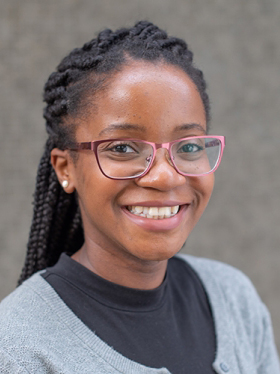 Anna Mwaba ’10, assistant professor of government, earned her doctorate in political science from the University of Florida, Gainesville, with concentrations in comparative politics and international relations. Her research focuses on the role of African international and regional organizations in election observation and democracy promotion in Southern Africa. Mwaba recently completed a two-year McPherson/Eveillard Postdoctoral Fellowship in Government. At Smith, Mwaba teaches on Africa’s place in international relations, African politics, elections around the world, and political development.
Anna Mwaba ’10, assistant professor of government, earned her doctorate in political science from the University of Florida, Gainesville, with concentrations in comparative politics and international relations. Her research focuses on the role of African international and regional organizations in election observation and democracy promotion in Southern Africa. Mwaba recently completed a two-year McPherson/Eveillard Postdoctoral Fellowship in Government. At Smith, Mwaba teaches on Africa’s place in international relations, African politics, elections around the world, and political development.
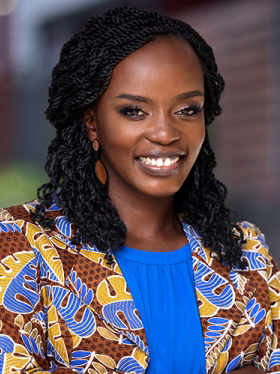 Sharon Owino, assistant professor of neuroscience, earned her Ph.D in biological sciences at the Morehouse School of Medicine in Atlanta and completed a postdoctoral fellowship at the Emory University School of Medicine in Atlanta. Owino is a neuroscientist interested in understanding receptor signaling mechanisms underlying central nervous system plasticity following injury. Her lab will use transgenic mice and various cellular models to explore how specific G-Protein coupled receptor signaling pathways alter the way the brain responds to injury. Owino is excited to continue her mission to help empower and educate women through science.
Sharon Owino, assistant professor of neuroscience, earned her Ph.D in biological sciences at the Morehouse School of Medicine in Atlanta and completed a postdoctoral fellowship at the Emory University School of Medicine in Atlanta. Owino is a neuroscientist interested in understanding receptor signaling mechanisms underlying central nervous system plasticity following injury. Her lab will use transgenic mice and various cellular models to explore how specific G-Protein coupled receptor signaling pathways alter the way the brain responds to injury. Owino is excited to continue her mission to help empower and educate women through science.
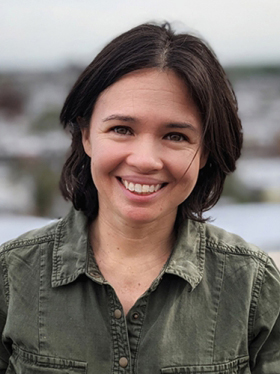 Melissa Parrish, assistant professor of English language and literature, researches and teaches multi-ethnic American literature, poetry and poetics, and narratives of U.S. exceptionalism, crisis rhetoric, and cultures of perpetual war. She is working on her first book manuscript, “Situation Normal: American Poetry in an Age of Emergency,” which treats activist poetry as a lens for querying public representations of national emergencies in the postwar United States. Parrish received her Ph.D. in literatures in English from Rutgers University, an M.A. in English from Georgetown University, and a B.S. in English from the United States Military Academy. She comes to Smith after completing a Henry Rutgers Postdoctoral Lectureship in the Department of English and Writing Program at Rutgers University-New Brunswick. Prior to beginning a career in academic study, she served in the U.S. military, including deployments to Afghanistan and Kuwait.
Melissa Parrish, assistant professor of English language and literature, researches and teaches multi-ethnic American literature, poetry and poetics, and narratives of U.S. exceptionalism, crisis rhetoric, and cultures of perpetual war. She is working on her first book manuscript, “Situation Normal: American Poetry in an Age of Emergency,” which treats activist poetry as a lens for querying public representations of national emergencies in the postwar United States. Parrish received her Ph.D. in literatures in English from Rutgers University, an M.A. in English from Georgetown University, and a B.S. in English from the United States Military Academy. She comes to Smith after completing a Henry Rutgers Postdoctoral Lectureship in the Department of English and Writing Program at Rutgers University-New Brunswick. Prior to beginning a career in academic study, she served in the U.S. military, including deployments to Afghanistan and Kuwait.
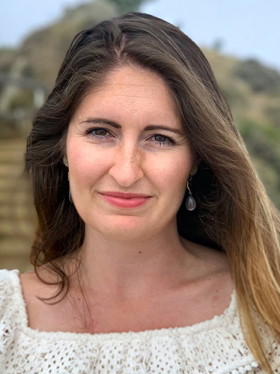 Lindsay Poirier, assistant professor of statistical and data sciences, is a cultural anthropologist of data advocacy, governance and infrastructure. Her research interlaces methods in cultural analysis and exploratory data analysis to critically examine how meaning gets made from data. In her current projects, she studies the provenance, form, semiotics and uptake of public interest datasets documenting social and environmental injustices in the United States. By analyzing the politics and categorical judgments that underlie source datasets, her work advances understanding of how and why certain people and problems come to be inequitably represented in data and also informs critical approaches to data science practice, policy and pedagogy. Poirier received her Ph.D. from the Science and Technology Studies program at Rensselaer Polytechnic Institute and came to Smith from UC Davis, where she was an assistant professor of data Studies in the Science and Technology Studies program. She is eager to teach introductory data science courses, alongside courses that introduce students to the socio-political contexts of data production and use.
Lindsay Poirier, assistant professor of statistical and data sciences, is a cultural anthropologist of data advocacy, governance and infrastructure. Her research interlaces methods in cultural analysis and exploratory data analysis to critically examine how meaning gets made from data. In her current projects, she studies the provenance, form, semiotics and uptake of public interest datasets documenting social and environmental injustices in the United States. By analyzing the politics and categorical judgments that underlie source datasets, her work advances understanding of how and why certain people and problems come to be inequitably represented in data and also informs critical approaches to data science practice, policy and pedagogy. Poirier received her Ph.D. from the Science and Technology Studies program at Rensselaer Polytechnic Institute and came to Smith from UC Davis, where she was an assistant professor of data Studies in the Science and Technology Studies program. She is eager to teach introductory data science courses, alongside courses that introduce students to the socio-political contexts of data production and use.
 Loretta Ross, associate professor of the study of women and gender, forged the movement for reproductive justice in the United States as one based in human rights and intersectional feminist praxis. Her scholarship addresses the systemic inequities of race, gender and sexuality, as well as lived ideologies and policies of white supremacy. Her current work advocates “calling in” to foster the civic potential for healthy public debates around divisive questions of racism and sexism. As a public intellectual, Ross has gained a national presence on these issues, with interviews across the media, including NPR, The New York Times and CBS. She received her B.A. from Agnes Scott College.
Loretta Ross, associate professor of the study of women and gender, forged the movement for reproductive justice in the United States as one based in human rights and intersectional feminist praxis. Her scholarship addresses the systemic inequities of race, gender and sexuality, as well as lived ideologies and policies of white supremacy. Her current work advocates “calling in” to foster the civic potential for healthy public debates around divisive questions of racism and sexism. As a public intellectual, Ross has gained a national presence on these issues, with interviews across the media, including NPR, The New York Times and CBS. She received her B.A. from Agnes Scott College.
Lucie Schmidt AC ’93, professor of economics, is an empirical microeconomist working in the fields of labor and health economics and the economics of the family. Specific research areas include social safety net programs in the United States with a particular focus on programs for individuals with disabilities; retirement security; and the economics of marriage and fertility decisions. She comes to Smith after 19 years as a faculty member at Williams College, where she most recently served as the John J. Gibson Professor of Economics. She is also a research associate at the National Bureau of Economic Research and a co-editor of the “Review of the Economics of the Household.” She has an A.B. in government from Smith, where she was an Ada Comstock Scholar, and has M.A. and Ph.D. degrees in economics from the University of Michigan.
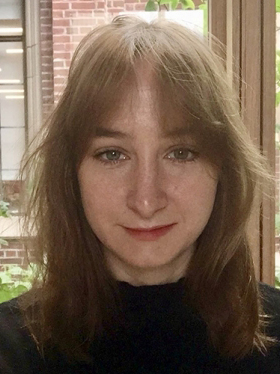 Maeve Sterbenz, assistant professor of music, received her Ph.D. from Columbia University. Her research investigates relationships between movement and musical experience in concert dance, music videos, and dance films, and she has developed an interdisciplinary approach to her work that bridges music theory and dance studies. Her current project, which considers the interaction between music perception and classical and contemporary ballet, builds on research she completed as 2019 scholar-in-residence at the San Francisco Ballet. The project’s central aim is to show that ballet plays an active role in shaping musical experience in ways that diverge from score-based analysis. Sterbenz comes to Smith from a Mellon postdoctoral position at Wellesley College. She is very excited to join the music faculty and to teach interdisciplinary music theory courses.
Maeve Sterbenz, assistant professor of music, received her Ph.D. from Columbia University. Her research investigates relationships between movement and musical experience in concert dance, music videos, and dance films, and she has developed an interdisciplinary approach to her work that bridges music theory and dance studies. Her current project, which considers the interaction between music perception and classical and contemporary ballet, builds on research she completed as 2019 scholar-in-residence at the San Francisco Ballet. The project’s central aim is to show that ballet plays an active role in shaping musical experience in ways that diverge from score-based analysis. Sterbenz comes to Smith from a Mellon postdoctoral position at Wellesley College. She is very excited to join the music faculty and to teach interdisciplinary music theory courses.
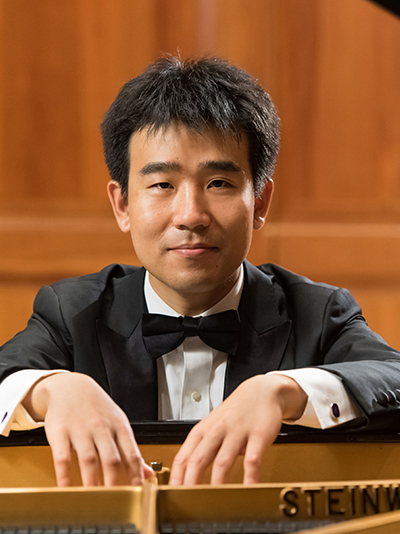 Jiayan Sun, assistant professor of music and the associate chair for performance activities, assumes his new role after serving for the past four years as the Iva Dee Hiatt Visiting Artist in Piano at Smith. Praised by The New York Times for his “revelatory” performances, Sun has performed with the Cleveland Orchestra, the Hallé Orchestra, the Chinese and RTÉ National Symphony Orchestras, the Fort Worth and Toledo Symphony Orchestras, the Toronto and Aspen Concert Orchestras and the Suwon Philharmonic Orchestra. He also has captured major prizes in the Leeds, Cleveland, Dublin and Toronto international piano competitions. Playing early keyboard instruments and studying historical performance practice have played a significant role in Sun's musical activities, with critically acclaimed appearances with the American Classical Orchestra in Alice Tully Hall at Lincoln Center. At Smith, he has performed Beethoven’s complete piano sonatas in chronological order in a series of eight recitals, in addition to presenting recital series devoted to the works of Schubert and Chopin. Hailing from Yantai, China, Sun received the Doctor of Musical Arts degree from The Juilliard School under the tutelage of Yoheved Kaplinsky and Stephen Hough.
Jiayan Sun, assistant professor of music and the associate chair for performance activities, assumes his new role after serving for the past four years as the Iva Dee Hiatt Visiting Artist in Piano at Smith. Praised by The New York Times for his “revelatory” performances, Sun has performed with the Cleveland Orchestra, the Hallé Orchestra, the Chinese and RTÉ National Symphony Orchestras, the Fort Worth and Toledo Symphony Orchestras, the Toronto and Aspen Concert Orchestras and the Suwon Philharmonic Orchestra. He also has captured major prizes in the Leeds, Cleveland, Dublin and Toronto international piano competitions. Playing early keyboard instruments and studying historical performance practice have played a significant role in Sun's musical activities, with critically acclaimed appearances with the American Classical Orchestra in Alice Tully Hall at Lincoln Center. At Smith, he has performed Beethoven’s complete piano sonatas in chronological order in a series of eight recitals, in addition to presenting recital series devoted to the works of Schubert and Chopin. Hailing from Yantai, China, Sun received the Doctor of Musical Arts degree from The Juilliard School under the tutelage of Yoheved Kaplinsky and Stephen Hough.
 Argyris Tsiaras, assistant professor of economics, received his Ph.D. in economics from Harvard University. Tsiaras is a macroeconomist with primary research interests in the areas of macrofinance, asset pricing and international finance. His research explores the impact of heterogeneity in financial portfolio investment and risk taking by different economic agents on macroeconomic outcomes, including wealth inequality, asset prices and business-cycle fluctuations.
Argyris Tsiaras, assistant professor of economics, received his Ph.D. in economics from Harvard University. Tsiaras is a macroeconomist with primary research interests in the areas of macrofinance, asset pricing and international finance. His research explores the impact of heterogeneity in financial portfolio investment and risk taking by different economic agents on macroeconomic outcomes, including wealth inequality, asset prices and business-cycle fluctuations.
Kimberly Ward-Duong, assistant professor of astronomy, received her Ph.D. in astrophysics from Arizona State University. She comes to Smith College upon completing one year of a prize postdoctoral fellowship at the Space Telescope Science Institute in Baltimore. Prior to that, she held the Five College Astronomy Department Education and Research Fellowship at Amherst College for three years. She studies stars with very low masses, which are by far the most common in our Milky Way Galaxy, the exoplanets that orbit around them, and the formation of those stars and planetary systems far beyond our solar system. As an observational astronomer, she conducts her research using large ground-based telescopes in Hawaii, Arizona and Chile, as well as space-based satellites such as the Hubble Space Telescope and soon, the upcoming James Webb Space Telescope. At Smith, Ward-Duong teaches courses on introductory astronomy, techniques of observational astronomy, and data science and statistics for astronomical research.
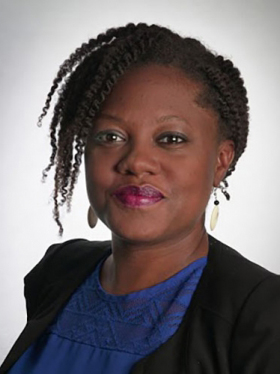 Traci-Ann Wint, assistant professor of Africana studies, earned a Ph.D. in African and African Diaspora Studies (AADS) in 2019 from UT Austin. She also holds a micro-master’s in instructional design and technology from the University of Maryland Global Campus. A Black feminist and critical race studies scholar, Wint is currently writing a book titled “Reviving Paradise: Tourism and Making the Jamaican Nation” that explores the ways a neocolonial tourism industry extends the raced and gendered hierarchies of the plantation in the modern anglophone Caribbean. She is the author of peer-reviewed articles on the Tambourine Army, a radical Jamaican women’s rights organization, and on mothering in the time of Black Lives Matter. She is also a published poet and experienced media producer. She comes to Smith after having worked most recently as a lecturer in AADS at UT Austin.
Traci-Ann Wint, assistant professor of Africana studies, earned a Ph.D. in African and African Diaspora Studies (AADS) in 2019 from UT Austin. She also holds a micro-master’s in instructional design and technology from the University of Maryland Global Campus. A Black feminist and critical race studies scholar, Wint is currently writing a book titled “Reviving Paradise: Tourism and Making the Jamaican Nation” that explores the ways a neocolonial tourism industry extends the raced and gendered hierarchies of the plantation in the modern anglophone Caribbean. She is the author of peer-reviewed articles on the Tambourine Army, a radical Jamaican women’s rights organization, and on mothering in the time of Black Lives Matter. She is also a published poet and experienced media producer. She comes to Smith after having worked most recently as a lecturer in AADS at UT Austin.